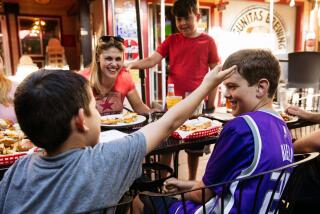The Hardest Words : Everyone Agrees That Teaching Kids About Abuse Is Important, but How, What and When to Tell Them Are Complicated Issues
- Share via
When her daughter, Aja, was younger, Denise Luca tried to make sure Aja was aware of the dangers of child abuse.
Whenever TV shows on the subject aired, they would watch them together. Afterward, Luca would ask Aja what she thought of them.
“I would say ‘Isn’t that terrible?’ ” recalls Luca, 40, of Northridge. “I would get her interpretation. Then I’d know what she saw, and if I wanted to go deeper into it (to explain), I could.”
Today, Luca continues to show her daughter, now 12, newspaper stories on child abuse. “I keep her constantly aware that it goes on,” she says.
Such at-home training is highly desirable for children to learn how to recognize and react to abuse, experts say. However, such parent participation is not always possible.
“Realistically, you (sometimes) have parents in the home who are perpetrators of child abuse,” says Shayla Lever, director of child abuse prevention for the Los Angeles Unified School District.
“You also have parents who are uncomfortable with the subject and don’t know how to approach it.”
Last year, the state received more than 570,000 reports of child abuse. To help expand children’s awareness, many schools and some religious institutions offer prevention programs.
Lever heads Project CARE, a voluntary anti-abuse training program that involves parents, teachers and students at 162 of the district’s 417 elementary schools.
CARE, which started in 1980, teaches children self-esteem, when it’s safe to say no and how to get away from a situation, and how to tell people about what happened.
Other programs offer abuse-prevention advice as well. At Aja’s school, Beckford Elementary in Northridge, Los Angeles Police Officers discuss child abuse as part of a drug-prevention program.
“The more (correct) information children get and the more times they hear it,” says Lever, “the better off they are.”
For parents, teachers and counselors, the first step is to help children understand what abuse is.
It’s “when people don’t respect your rights and do things to you and then tell you to keep it a secret,” says Armando Magana, 12, a sixth-grader at Oxford Street school in North Hollywood.
“It’s all right to spank,” says Raymond Hughes, 11, a sixth-grader at Beckford. “But you don’t just haul off like Homer does on the Simpsons and start wringing somebody’s neck.”
Adds Aja Luca: A child who has been abused may believe that “when you grow up, it’s all right to hit your kid. That parents are allowed to hit you and you can’t do anything about it. Because they are parents and you are supposed to respect them and not talk back. . . . But it’s wrong. If you get abused, you should tell someone you can trust.”
The next step is to help children understand what to do if they think they have been abused. However, children sometimes resist the advice because they’re afraid of losing their families.
Linda Greenfield, a teacher at Trinity Elementary School in Los Angeles, says her students sometimes come to class with large bruises.
“I’ll say, ‘What happened?’ ” says Greenfield, who, like all California teachers, is required to report suspected abuse to law enforcement or social service agencies. “Another kid will say, ‘Don’t tell her or they’ll take you away from your parents.’ The kids are on to the system. They won’t tell because they know that after a certain number of reports against a parent, they’ll take a kid away from home.”
While teaching kids about abuse is important, how and what to teach them are complicated issues.
“I don’t think children are nearly as informed as they need to be,” says Don Fleming, a Beverly Hills psychotherapist who works extensively with young people.
“There’s still controversy in certain parts of the country as to whether people want this information to come out. . . . In some places, people think it’s inappropriate for their children to know these things or that only the church or the family should talk about this information.”
Some may hesitate to teach about abuse on the assumption that what children know can hurt them, particularly if the advice comes in blanket statements.
“A blanket statement like ‘don’t talk to strangers’ is complicated to a kid,” Fleming says. “They don’t know what a stranger is. . . . You can overwhelm a child and make him overly fearful.”
Lever of Project CARE remembers a 6-year-old girl “who would not leave her house for months,” except to be driven to school, after her parents made her extremely fearful of strangers.
“The appropriate message is that the child should not talk to anyone she hasn’t seen with her parents,” Fleming says. “And you differentiate that from the situation when you go into the store and a clerk says ‘hi.’ That doesn’t mean you can’t say ‘hi’ to him.”
Lever says another common generalization--telling children to say no in all situations--also can be dangerous.
“Saying no works well with a nonviolent pedophile. . . . But it’s almost never effective in a home where the perpetrator is a stepfather or a dad, for example.
“It’s impossible for child to say no to a person who they look to for all their protection. That person has tremendous power. They can impose corporeal punishment. Or they can withhold physical necessities or love, affection and attention.”
If children feel they cannot get away from an abuser, Lever says, they should still report what happened but “think to themselves and believe that what happened was not their fault and that it will not last forever and they don’t deserve it. Because victims of abuse think it’s their fault or they’ve caused the abuse.
“This is a critical concept. It’s something a child can use no matter who the perpetrator is or what the circumstances.”
Experts and parents also debate when to teach children about abuse.
“Some research challenges any attempt to provide sexual abuse education to preschoolers,” says Dr. Roland Summit, a psychiatrist and child-abuse expert at Harbor-UCLA Medical Center, “because the children are too young to make value judgments about what is good touching and what is bad touching. They are abstract concepts the children can’t comprehend.
“At the elementary level, research tests about whether these programs work have been iffy. . . . There is the risk of interfering with a child’s sense of security. If you convince a 6-year-old that the minister or principal might molest him, the education is of dubious value if the likelihood of molestation is not high and if, when it happens, they can’t do anything about it.”
Nevertheless, children talk more about child abuse and seem to understand it better than in the past, Summit says. They also say they think it’s important to learn about the subject.
“Kids should be aware about child abuse because it might happen to them and they may not realize it,” says Amanda Light, 11, a student at Beckford Elementary.
“It’s unbelievable that child abuse happens,” says schoolmate Maria Santos, also 11. “Who would think that parents would hit their kids that way? If they love them so much, why would they hurt them?”
More to Read
Sign up for Essential California
The most important California stories and recommendations in your inbox every morning.
You may occasionally receive promotional content from the Los Angeles Times.










